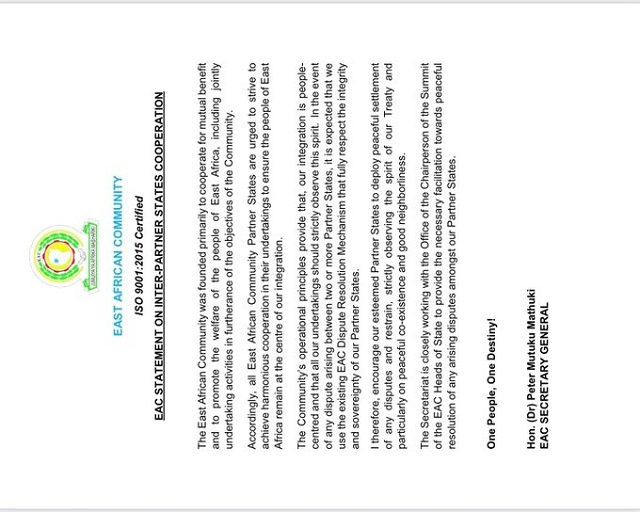
NAIROBI, KENYA | Xinhua | The East African Community (EAC), a regional economic bloc, on Friday urged member states to settle diplomatic and trade disputes amicably.
The EAC Secretary General Peter Mathuki, through a statement released in Nairobi, the Kenyan capital, said the bloc was ready to mediate a diplomatic spat between Rwanda and neighboring Burundi.
The dispute between Rwanda and Burundi escalated Thursday after Bujumbura, the largest city of Burundi, announced the closure of the two countries’ common border.
In a rejoinder, Rwanda termed the move unwarranted and a violation of the principles of integration, and free movement of people and goods as espoused in the EAC treaty.
The border closure came in the wake of Burundi accusing Rwanda of hosting and training rebel groups that claimed responsibility for an attack near Burundi’s western border with the Democratic Republic of the Congo (DRC).
Mathuki decried escalating diplomatic row among EAC partner states terming them detrimental to the bloc’s bid for seamless connectivity, trade, and integration.
“Partner states are urged to strive to achieve harmonious cooperation in their undertakings to ensure the people of East Africa remain at the center of our integration,” Mathuki said.
He added that the bloc’s operational principles dictate that member states pursue a people-centered integration, and in the event of disputes, they embrace dialogue and respect for sovereignty.
Both Rwanda and Burundi joined the eight-member EAC in 2007, while South Sudan joined in 2016 followed by the Democratic Republic of the Congo in 2022 and Somalia in 2023.
Kenya, Uganda, and Tanzania were the earliest members of the bloc when it was operationalized in November 1999 but simmering disputes among partner states threaten the realization of its integration agenda.
Recently, Uganda sued Kenya at the East African Court of Justice as the two neighboring countries escalated disputes over trade in oil products.
In its submission at the regional court, Uganda accused Kenya of denying it a permit to ship oil using the latter’s transport and storage infrastructure, terming the move detrimental to the spirit of integration.
Kenya said it could not issue a license to Uganda National Oil Company to export the commodity after it failed to meet certain requirements.
These requirements, according to Kenya’s Ministry of Energy and Petroleum, include the Ugandan oil agency demonstrating the annual sale of 6,600 cubic meters of petroleum.
Uganda imports about 90 percent of its refined petroleum products through the port of Mombasa, on the Kenyan coast, using the Kenya Pipeline Corporation pipeline.
Ugandan President Yoweri Museveni in late 2023 blamed Kenya’s oil marketing companies for inflating the price of petroleum sold in his country, adding that the government in Kampala was exploring different options including purchasing the commodity directly from oil-producing states in a bid to rein in prices.
As a landlocked country, Uganda also depends on the Mombasa port and Kenya’s extensive road and rail network to transport manufactured goods imported overseas. ■
 The Independent Uganda: You get the Truth we Pay the Price
The Independent Uganda: You get the Truth we Pay the Price





